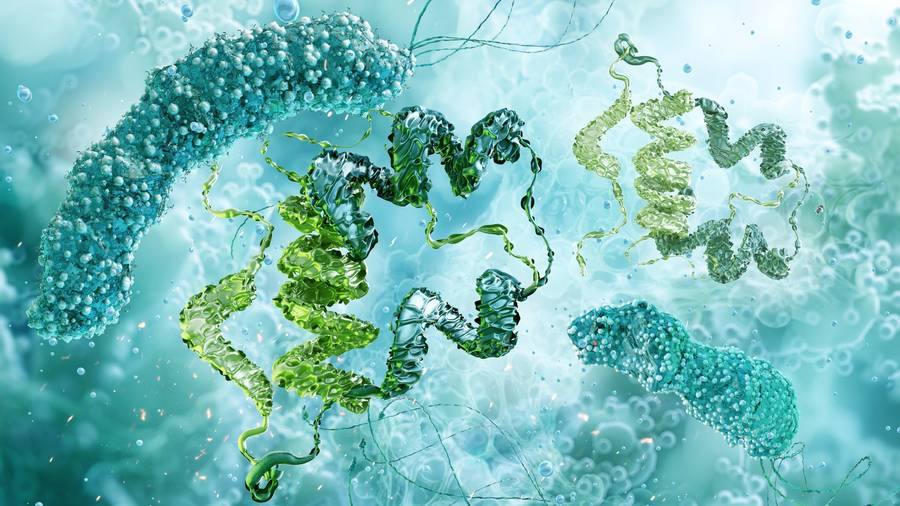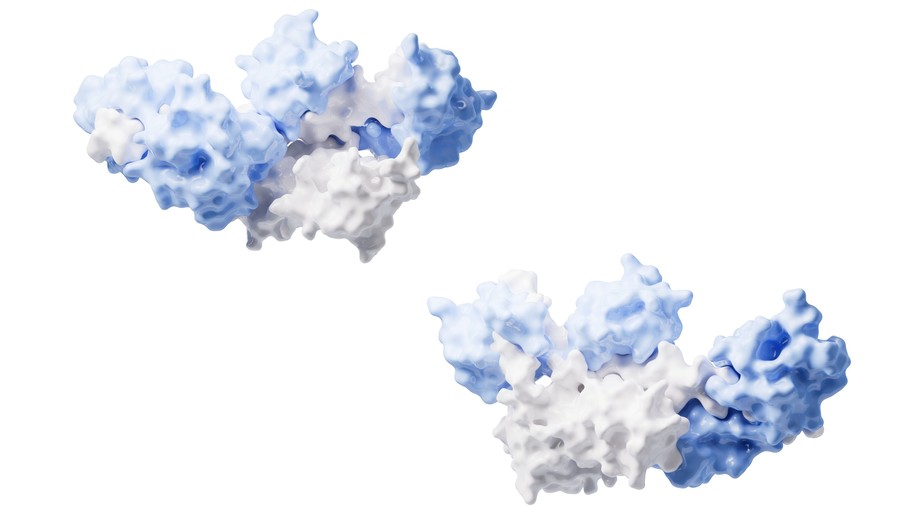Browse by Product Category
Therapeutic proteins represent a significant advancement in modern medicine, offering targeted and effective treatments for various diseases. These bioengineered proteins mimic natural proteins in the body to restore function, regulate processes or fight disease. Their applications range from the treatment of metabolic and autoimmune disorders to cancer and infectious diseases.
Creative BioMart offers a wide range of therapeutic protein products. You can easily search for products by disease, target, protein type, and more, or contact us directly for further details.

Therapeutic proteins are a broad class of biologics that have revolutionized medicine. Unlike traditional small-molecule drugs, these proteins offer high specificity and reduced off-target effects, making them particularly effective in complex diseases. The development of therapeutic proteins has been facilitated by advances in genetic engineering, recombinant DNA technology and protein expression systems.
The development of therapeutic proteins dates back to the 20th century, with the first recombinant human insulin approved in 1982. Since then, technological advances have led to the production of monoclonal antibodies, enzyme replacement therapies and cytokines, among others. The increasing use of biopharmaceuticals underlines the critical role of these proteins in modern therapeutic strategies.
Therapeutic proteins work through a variety of mechanisms, depending on their specific function and the disease they target. Their primary mechanisms include:
Enzyme Replacement Therapy (ERT)
Many diseases arise due to deficiencies or malfunctions in specific enzymes. Enzyme replacement therapy involves administering recombinant versions of these enzymes to restore normal physiological function. Examples include:
Receptor Targeting
Some therapeutic proteins function by binding to specific cellular receptors, either activating or inhibiting signaling pathways. These include:
Immune Modulation
Certain therapeutic proteins modulate the immune system by either stimulating or suppressing immune responses. Examples include:
Replacement of Functional Proteins
Some diseases are caused by genetic mutations that result in the absence or dysfunction of critical proteins. Therapeutic proteins can replace these missing components, such as:
By leveraging these diverse mechanisms, therapeutic proteins enable precise and highly effective disease interventions while minimizing systemic toxicity.
Therapeutic proteins are categorized based on their functional role and application. Our classification system includes the following:
These biologics are used to treat cancer, infectious diseases, autoimmune disorders, neurological disorders and a range of other chronic and complex conditions. By targeting the root causes of disease, whether genetic mutations, immune system dysfunction or abnormal cell signaling, therapeutic proteins can provide precise solutions that significantly improve patient outcomes.
Therapeutic proteins also show promise in the treatment of osteological disorders, gastrointestinal diseases, and ophthalmological conditions, where targeted biologics can reduce inflammation or correct genetic defects. Myopathological disorders, including muscular dystrophy, are also being addressed through proteins that correct or compensate for defective muscle proteins.
Finally, beyond the more commonly treated areas, other disease areas such ischemia reperfusion injury, reproductive system diseases, and urology are also benefiting from this emerging class of therapies.

Our portfolio includes a broad range of therapeutic proteins against more than 400 different drug targets. The A to Z of potential targets ranges from A2M (alpha-2-macroglobulin), which plays a role in protease inhibition and has therapeutic potential in inflammatory and neurodegenerative diseases, to Zika virus, whose infection during pregnancy can cause severe birth defects. This extensive list includes targets involved in signal transduction, immune modulation, cell growth, angiogenesis, and more.
Browse Therapeutic Proteins based on alphabetical listing:
A B C D E F G H I J K L M N O P Q R S T U V W X Y Z
Hot Products
Each of these targets has been extensively studied, and therapeutic proteins designed to interact with them are already playing an important role in the treatment of patients around the world. By focusing on these highly specific targets, therapeutic proteins can modulate disease processes with remarkable precision, leading to more effective treatments and improved patient outcomes.

The therapeutic protein development pipeline is a complex, multi-step process that involves rigorous testing, regulatory approval and ongoing monitoring to ensure both efficacy and safety. From early-stage investigational studies to the final stages of regulatory approval, each therapeutic protein must undergo extensive scrutiny. The pathway also includes stages for veterinary approved treatments, as well as the possible withdrawal from the market due to safety or efficacy concerns. Creative BioMart offers related therapeutic proteins at various stages of this pipeline.
The Investigational stage represents the initial phase of therapeutic protein development. Often referred to as the preclinical phase, the protein is tested in the laboratory and in animal models to evaluate its biological activity, safety, and therapeutic potential.
At this stage, the therapeutic protein is not intended for human use, but preclinical results provide the basis for the next step: human clinical trials.
After positive results in preclinical testing, a therapeutic protein enters the Experimental phase, which includes the clinical trial process. This phase is critical because it is the first time the protein is tested in humans. The goal is to gather data on safety, dosing, and preliminary efficacy.
For proteins intended for use in animals, the Vet-approved stage represents approval by the relevant authorities, such as the FDA Center for Veterinary Medicine (CVM) or the European Medicines Agency (EMA). Like their human counterparts, veterinary therapeutics must undergo clinical trials to demonstrate safety and efficacy in animals.
The Approved stage is where a therapeutic protein achieves full regulatory approval from agencies such as the FDA (U.S.), EMA (EU), or PMDA (Japan). This stage indicates that the protein has successfully completed clinical trials demonstrating both safety and efficacy in humans (or animals, in the case of veterinary products). Upon approval, the protein can be marketed and distributed for clinical use, and it is officially recognized as a treatment option for the specific condition it targets.
At this point, the protein will enter the market and be made available to patients under the guidance of healthcare providers. It will also undergo post-marketing surveillance to monitor any potential long-term side effects or emerging risks, particularly in large patient populations.
The Withdrawn stage occurs if, after approval, the therapeutic protein is determined to pose unforeseen risks or fail to meet safety or efficacy expectations once it's on the market.
Even after withdrawal, some therapeutic proteins may still be available in certain markets under specific conditions (e.g., compassionate use programs or if no viable alternatives exist).
Creative BioMart offers therapeutic proteins that can be categorized based on their origin, structure and function. From recombinant proteins to monoclonal antibodies, the versatility of therapeutic proteins enables precise treatments for various medical conditions ranging from cancer to genetic disorders.
Recombinant proteins are produced using recombinant DNA technology, in which the gene encoding the desired protein is inserted into a host cell (such as Escherichia coli or Chinese hamster ovary (CHO) cells) for expression and purification. These proteins are often designed to mimic human proteins, making them suitable for use in the treatment of diseases caused by protein deficiencies, genetic mutations, or immune dysfunction.
Native therapeutic proteins are naturally occurring proteins derived directly from human, animal or microbial sources. These proteins are typically obtained from biological fluids (such as blood plasma) or tissue extracts and are used when recombinant options are either unavailable or less effective. They are used to treat conditions in which the protein is either deficient or dysfunctional.
Chemically synthesized proteins are produced by solid-phase peptide synthesis (SPPS) or other synthetic techniques. This method is particularly useful for producing smaller proteins or peptides that are difficult to produce using biological systems. Chemically synthesized proteins can be designed with specific modifications, such as post-translational modifications or non-natural amino acids, to enhance their stability, potency, or target specificity.
Enzymes are proteins that catalyze specific biochemical reactions. Therapeutic enzymes are often used to replace missing or deficient enzymes in patients with inherited enzyme deficiencies or metabolic disorders. These enzymes can be recombinant or native and are used to restore normal metabolic processes.
Cytokines are signaling proteins that regulate immune responses and cellular communication. Therapeutic cytokines are used to either stimulate or suppress immune function in a variety of diseases, including autoimmune disorders, inflammatory diseases, and cancer. By enhancing or inhibiting specific immune pathways, cytokines can modulate disease processes with high specificity.
Monoclonal antibodies (mAbs) are antibodies produced by a single clone of cells, making them highly specific to a particular antigen. These antibodies can be designed to target specific disease-causing molecules, such as cancer cells, pathogens, or components of the immune system. Monoclonal antibodies are used for a wide range of applications, from modulating the immune system to treating cancer.
Fusion proteins are created by combining two or more different proteins or peptides into a single functional entity. This fusion allows for increased potency or the ability to target multiple biological pathways simultaneously. Fusion proteins are used in cancer therapy, autoimmune diseases and genetic disorders.
Growth factors and neurotrophic factors are proteins that promote cell growth, differentiation, and survival. These proteins are essential in tissue repair and the treatment of neurological diseases, as they can help regenerate damaged tissues and neurons.
Therapeutic peptides are short chains of amino acids that can mimic or block specific biological functions. Due to their smaller size and simpler structure, peptides are easier to synthesize than larger proteins, making them an attractive option for the development of novel treatments. They are widely used in the treatment of cancer, hormonal disorders and infectious diseases.
Hormones and hormone analogues are proteins that regulate various physiological processes. Many diseases are associated with deficiencies or excesses of certain hormones, and these therapeutic proteins are used to replace or modulate these hormones.
Inhibitors are therapeutic proteins that block specific enzymes or pathways involved in disease processes. These proteins can stop abnormal cellular functions and are often used to treat cancer, autoimmune diseases and infectious diseases.

Therapeutic proteins have transformed the landscape of modern medicine, offering precise and effective treatment options for a wide range of diseases. With our diverse product portfolio, cutting-edge technology, and unwavering commitment to quality, we are at the forefront of therapeutic protein innovation. Whether you are a researcher, clinician, or pharmaceutical developer, our advanced biologics provide the reliability and efficacy needed for groundbreaking discoveries and treatments.
Take the next step in therapeutic protein research and development. Explore Creative BioMart's comprehensive product offerings and partner with us to drive biopharmaceutical innovation. Contact us today to discuss your specific needs and discover how our solutions can enhance your research and therapeutic strategies.
For more information on how our products could help advance your project, please contact us.
ENTER YOUR EMAIL HERE TO SUBSCRIBE.
Copyright © 2026 Creative BioMart. All Rights Reserved.